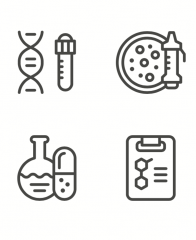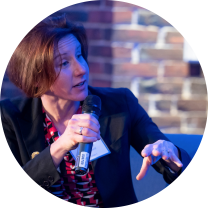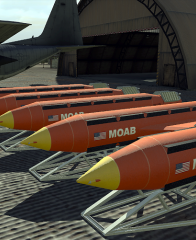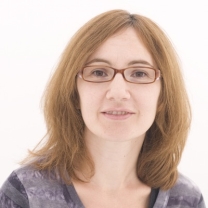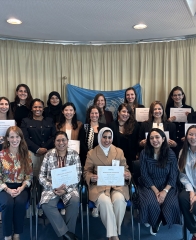 / Tech Policy at the GeoTech Center
Subscribe
/ Tech Policy at the GeoTech Center
Subscribe
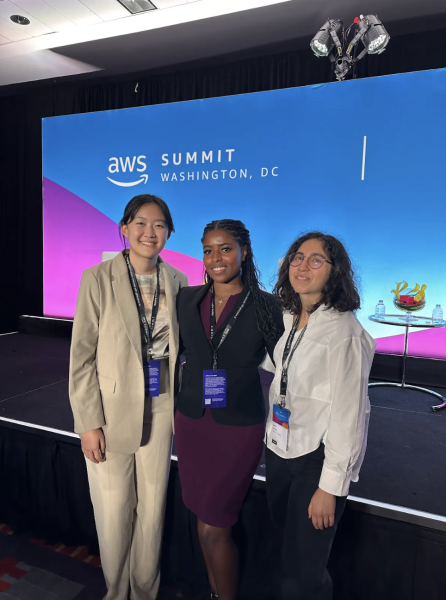
However, with the rise of semiconductor regulations, quantum technology, and the AI boom in late 2022, I found my career focus in tech policy. The Albright Institute’s Wintersession last January was particularly pivotal in developing my interest in international technological development, and I decided to pursue this field by working at the Atlantic Council’s GeoTech Center. My primary goal for this internship was to understand the international tech policy landscape, as it is relatively new compared to the established policy areas I had studied at Wellesley. I aimed to learn how far tech policy had developed, identify key players and organizations, and explore potential career paths in the international sphere. I am pleased to say that this internship not only met these goals but also broadened my perspective and personal development in unexpected ways.
One of my major projects involved working on a Notice of Funding Opportunity (NOFO) for the State Department in collaboration with the Meridian International Center. This project focused on developing a new fellowship program for the GeoTech Center, centered on critical and emerging technologies. My role included conducting extensive desktop research to identify these key technologies, drawing from statements by prominent figures such as Secretaries of State or White House officials. My research led me to pinpoint six pivotal technologies I recommended the new program focus on, including AI, quantum computing, and biotech. After identifying these technologies, I was asked to research key standards-making organizations and conferences, such as the OECD Programme on AI. Through my research, I was able to gain a deep understanding of cutting-edge developments in technology and their potential applications in security and global well-being.
In addition to my research, attending high-profile events was another significant aspect of my internship. In June, I had the incredible opportunity to staff a private event on AI at the Amazon Web Services (AWS) Summit in Washington, D.C. This experience exposed me to the highly formal environment of such events and allowed me to interact with high-level policy professionals, including ambassadors and national security directors. Networking with representatives from AWS, Accenture, and Intel through adjoining panels was also invaluable to build my connections in the private technology industry. A few weeks later, I was also able to attend a roundtable discussion with Accenture on the sidelines of the 2024 NATO Summit. The level of professionalism and the international significance of the conversation far exceeded my expectations for an undergraduate internship, and I am profoundly grateful to my team for letting me be a part of such high-profile events.
My most memorable experience was a private dinner hosted by the GeoTech Council in partnership with CISCO, which focused on enhancing cybersecurity capacity in African economies. I was deeply struck by how the informal nature of the event contributed to its profound impact; it showcased how simple conversations among thought leaders determines future policy in emerging fields like technology. During this dinner, I had the privilege of seeing multiple ideas, standards, and future policies being discussed and formulated in real time. This event also helped me realize the importance of building connections, particularly as tech and international politics are both fields where women are still underrepresented in senior roles.
Lastly, while the GeoTech Center was exceptional in supporting my professional growth and network building, I initially had concerns about my technical development due to the Atlantic Council’s policy-focused nature. I feared that I might not gain enough technical exposure and that my experience might be too narrow, especially as I had interned another D.C. think tank the summer before. However, the GeoTech team made a concerted effort to tailor the internship experience to my technical interests. Over the summer, I worked on a project that involved creating a master contact list by consolidating over 10,000 entries from 165 spreadsheets using Python. Working on this project significantly enhanced my data management and programming skills. Additionally, when tasked with overseeing online registration for the AWS event, my supervisor entrusted me with the responsibility to semi-automate the process with JavaScript. My technical skills have not only grown but also became directly applicable to real-world projects, making this internship a perfect blend of my dual interests in technology and policy.
I’m incredibly grateful to the GeoTech Center for giving me the freedom to work with both technology and policy. Their commitment to my professional and technical growth ensured that my goals were achieved and kept my work dynamic and engaging. Additionally, the team’s openness and support helped me build lasting relationships, and I intend to stay in touch with them as I advance into my senior year. This experience has not only solidified my passion for policy and think tank research but has also provided me with valuable skills and insights for a future career in international technology development. I deeply appreciate the support from the Albright Institute that made this opportunity possible, and I’m excited to apply what I’ve learned as I continue to explore and contribute to this exciting field.
